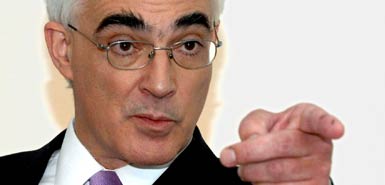Since many of the banks had seemed to have failed to pass on the Bank of England’s very generous 1.5% cut in interest rate to their customers on the Standard Variable Rate (SVR) mortgages, the mischievous bankers were summoned to a meeting with the head teacher, a.k.a., Alistair Darling, the Chancellor of the Exchequer. They were told to pass on the interest rate cut to their customers, or else, face detention.
A standard variable rate is where the interest rate is tracked by the lender, solely at its discretion, to the base rate of the Bank of England or the LIBOR rate. So, the obvious excuse that the bankers gave for not passing on this cut was that the cost of borrowing money on the open market, i.e., the LIBOR rate, had not come down at the same rate. That’s true, although the LIBOR rate did drop by 1.07% from 5.56% to 4.49% on Friday. The lowest rate since May 2004, incase you thought why it was that significant.
Bowing to pressure, Lloyds TSB, Halifax, Nationwide, Abbey, Royal Bank of Scotland, NatWest (part of Royal Bank of Scotland), Northern Rock and Bradford & Bingley have all cut the interest rate by a full 1.5%. Also, the fact that the LIBOR rate has fallen makes it hard for the banks to justify their reluctance to pass on the cut.
Latest deals on lastminute.com
Usually, the banks are quite quick to match a hike in interest rate by the Bank of England because it allows them to justify doing so. However, they don’t seem so keen when the rate is cut.
The opposite is true for the savings rate. Most banks have been more than happy to cut the interest rates on their savings account using the recent cut in rates by the Bank of England as the justification. This hardly seems like the right thing to do when banks are desperate for funds to lend and one of the sources is the deposits by the customers, the other being borrowing on the open market. Since its expensive to borrow on the open markets, as the banks themselves are saying, they should be trying to entice customers to deposit money.
But what’s amusing is that Alistair Darling and his advisors actually assumed that the banks would pass on the cut to their customers. Why would they? They are not charitable institutions that work for the best interests of their customers. They are financial institutions whose main aim is to make profit and make their shareholder’s investment in them worthwhile. Lets not forget that banks all across the globe have lost billions, if not trillions, of pounds in the financial crisis. So, it is but obvious that they would try hard as they could to make up for the loss.
Web exclusive offers from T-Mobile – Apply online now
No wonder then that people have literally started to stuff cash under their mattresses. The chief executive of G4S, the security transport company, Nick Buckles, recently said that the amount of cash in the system had increased since people are preferring to use cash instead of credit. It emerged recently that the number of £50 notes in circulation had increased by 20%.
He added, “People use it as a means of budgeting. They don’t like credit, so clearly there’s more cash transactions, more ATM transactions. And I guess the £50 note issue is people hoarding cash at home.”
